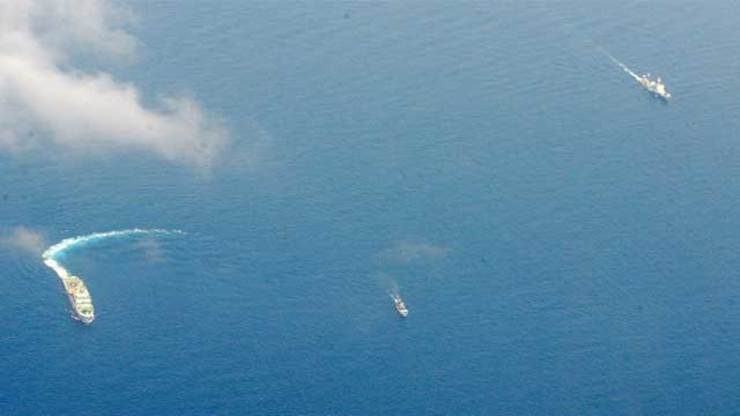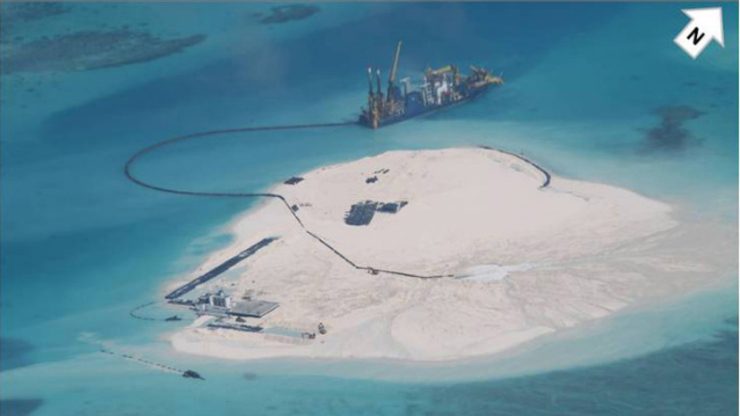SUMMARY
This is AI generated summarization, which may have errors. For context, always refer to the full article.

MANILA, Philippines – While pushing for arbitration as a “final approach” to resolve South China Sea disputes, the Philippines raised the alarm about China’s “sovereignty patrols” meant to stake its claim over the contested waters.
Will arbitration suffice in settling problems such as these in the South China Sea?
In an interview with Rappler on June 26, maritime law expert Jay Batongbacal explained that the legal track “has always been not enough.”
“What China is demonstrating is, in the end, ultimately, the law will not help,” said Batongbacal, director of the University of the Philippines Institute for Maritime Affairs and Law of the Sea.
Batongbacal said this as China conducted reclamation activities to build artificial islands in the South China Sea.
The Philippines’ Department of Foreign Affairs (DFA) said in May that reclamation is “jeopardizing” the Southeast Asian country’s case against China, but Batongbacal told Rappler the reclamation doesn’t legally jeopardize the case.
He said what jeopardizes the case is the “practical implication” involving China’s “cabbage strategy.”
Quoting Major General Zhang Zhaozhong of the Chinese People’s Liberation Army, the New York Times said the cabbage strategy “entails surrounding a contested area with so many boats – fishermen, fishing administration ships, marine surveillance ships, navy warships – that the island is thus wrapped layer by layer like a cabbage.”
Batongbacal said incidents such as China’s deployment of Haiyang Shiyuo 981 (HS-981), a deep-see drilling platform inside Vietnam’s exclusive economic zone, also complicates the problem.
Rappler is publishing excerpts from the interview with Batongbacal below, as the Philippines is set to file a diplomatic protest against China’s sovereignty patrols.

RAPPLER: Sir, weeks ago the DFA said the reclamation activities could jeopardize our case? Do you agree?
BATONGBACAL: No. The merits of the case were set when we filed the Statement of Notification and Claim. These activities are taking place after the case has been filed, they cannot affect the merits of the case as filed. Legally, it doesn’t jeopardize it. It’s the practical implication that is jeopardizing the Philippine position – the fact that China can fully implement the so-called “cabbage strategy” as soon as that base is completed. That is what jeopardizes the Philippine position regardless of the legalities.
RAPPLER: So what is jeopardized is not anymore the legal aspect but probably the defense aspect?
BATONGBACAL: The reality of the situation: that right now, the Philippine positions are there but our hold on them is already very difficult, in some cases very tenuous.
RAPPLER: So even if we win the case…
BATONGBACAL: Even if we win the case, China can still carry out its cabbage strategy, and ultimately we lose. What China is demonstrating is, in the end, ultimately, the law will not help.
RAPPLER: So are we saying the legal track is not enough?
BATONGBACAL: Yes. It has always been not enough. That has always been my position. When this case was being presented to the public last year it’s as if this is the final solution, this is what will create a durable solution. China’s reaction is showing us exactly how it’s not the case, and how ultimately, the tribunal will not be able to do anything if China goes ahead and ignores them. Right now it’s telling us, “Yes, sure you have a pending case but we will continue with what we want to do, and what we want to do is establish these artificial islands. What we want to do is to tighten our grip on the South China Sea, so go ahead and file your case, and prosecute it. Let’s see what will happen.”
RAPPLER: Sir, it’s interesting that this is coming from you as a maritime law expert.
BATONGBACAL: Because it’s not so legalistic?
RAPPLER: Yes, because…
BATONGBACAL: Because it’s still “might makes right”?
RAPPLER: Maybe because people expect experts like you to have ultimate faith in the law.
BATONGBACAL: Yes. It’s different when it comes to the international community, and international law, take a look at what’s happening elsewhere in the world. What has international law actually done for Syria? What has international law actually done for Ukraine? These examples tend to bring down expectations.
RAPPLER: So what can international law do?
BATONGBACAL: To China? On this issue, it’s secondary. That’s what they’re showing by doing all of these things – HS-981, reclamation. It’s clear that as far as China is concerned, international law is merely an instrument. And as an instrument, it can be basically bent to its will. And that’s what they’re doing. They’re forcing it to bend to their will. They go ahead with HS-981 and say, “No, we have full legal rights in that area.” They go ahead with reclamation and say, “That is our sovereignty, it’s none of your business what we want to do here.” They blockade our ships, and say, “That is our right, because it is our sovereign right.”
RAPPLER: Are we saying that international law is useless in this case?
Even if we win the case, China can still carry out its cabbage strategy, and ultimately we lose.
– Jay Batongbacal, maritime law expert
BATONGBACAL: I guess you could say I’m from the realist school. You have to understand that international law, by and large, still works on the basis of consensus, on the basis of consent by States. It’s still more like a primitive law of contract. That’s why the consent of China to the arbitration is important. Consent of the States is what ensures that eventually, the law will be complied with; it will actually be followed. The ability of the law to control the actions of States right now is still relatively limited and varies a lot compared to, say, domestic law. Why? Because in domestic law, you have a third party – the State – being able to coerce, being able to force the citizens to follow the law. In the international community, there is none. There is still no entity superior to the nation-State. Whether it’s China or the Philippines or the United States, there is still technically no international entity that is above all of them. All States are still equal. In that situation, what is the role of international law? It is only a moderating force that relies on voluntary compliance, rather than a coercive force that can resort to enforcement by a third party.
RAPPLER: How do you define a realist in relation to international law?
BATONGBACAL: A realist is one, probably, who realizes or who knows or who accepts that in international relations, in the final analysis, power is what will determine the course of action of States, and whether or not they will comply.
RAPPLER: But last year, I remember the Palace spokesman saying that the Philippines will use its moral suasion against China. And then Paul Reichler, the Philippines’ lawyer, saying…
BATONGBACAL: …that China will not want to be seen as a rogue state, China values its image in international law, China will want to be seen as being a responsible power.
RAPPLER: And 95% of states comply with international rulings.
BATONGBACAL: Yes.
RAPPLER: How do we reconcile this with your realist point-of-view?
BATONGBACAL: I think we have to acknowledge that in international relations, law still has a lot of limitations in its ability to influence States….It moderates their behavior, to a certain extent, but it cannot force them to do anything they do not want to do. Here, in this situation, all that we can hope for is to somehow moderate China’s behavior.
RAPPLER: If we win the case.
BATONGBACAL: Yes.
RAPPLER: So what’s the best-case scenario, if we win the case?
BATONGBACAL: Best-case scenario, we win the case, we get a ruling on the 9-dash line that’s in our favor, China says, okay, we will conform with international law.
RAPPLER: But China will not…
BATONGBACAL: But China will not withdraw from their positions. We can be sure of that. China will not stop its maritime enforcement patrols. They’ll probably back up a little bit in terms of the boundaries that they’re trying to enforce, but they will not give up.
RAPPLER: So given your realist point-of-view, what’s the best-case scenario that you expect if we win the case? Given the reclamation, everything.
BATONGBACAL: The best-case scenario for us will be, after winning the case, the two sides decide to go to the negotiating table. Like I said before, whatever the tribunal decides, we will always go back to the two countries sitting down to talk it out, because the alternative to that is for one of them to go to war. And we know who wins in that scenario. So we will always go back to the negotiating table.
RAPPLER: Are you saying, Sir, that we should drop the case?
BATONGBACAL: No. What I’m saying is, if ultimately, it will end with the parties going back to the negotiating table, we better be prepared for it. And the situation at that time when we do go back there, obviously, will have changed a lot. The arbitration serves a purpose, despite its limitations. But we need to develop alternative and complementary strategies, and we need to use all avenues. We cannot depend solely on the arbitration for the future of this dispute.
– Rappler.com
Add a comment
How does this make you feel?
There are no comments yet. Add your comment to start the conversation.